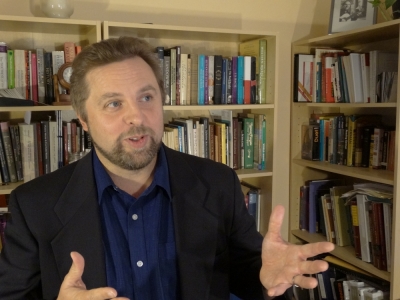Trump's Victory Marks the Decline of Secularism

"Imagine what our country could accomplish if we started working together as one people, under one God, saluting one American flag." — Donald J. Trump
So on Monday morning, I posted a video on my YouTube channel predicting a Trump win on Tuesday, November 8. I saw the victory coming from three vantage points, two of which were supplied by the excellent election predictor known as "The Primary Model" devised by Stony Brook University professor Helmut Norpoth, and the other by the worldwide dynamics behind the recent Brexit vote which were evident in the Trump campaign.
But how could the mainstream media have been so wrong?
We need to understand that the old establishment media outlets self-consciously perpetuate a secular vision of life which sees the world in terms of two groups of people: those who support a secular vision of life and who are thereby rational and liberal, and those who resist a secular vision of life and who are therefore by definition irrational and repressive. So the various establishment media and journalistic outlets are largely incapable of understanding and interacting with non-secular conceptions of life.
It is the waning of this secular vision of life that is perhaps the most significant indicator of Trump's win.
We are now entering into what scholars call a post-secular society age. As the name implies, a post-secular society is one that no longer subscribes to the two fundamental commitments of secularism: scientific rationalism and personal autonomy or lifestyle values. At a very basic level, post-secular society is about the return of religion and religious values in the public square. We've seen this with the advent of Sharia councils in the U.K. that arbitrate between conflicts among Muslims, the resurgence of the Russian Orthodox Church as a major political, moral, and cultural force in the Russian Federation, the revival of imperial Shintoism at the highest levels of the Japanese government, a revitalization of Confucian philosophy among Chinese officials, Hindu nationalism in India, Islam in Turkey, and on and on.
Here in the U.S., similar processes are evident in the increasing collapse of multiculturalism and political correctness, which together represent the value system of secularization. Multiculturalism is the idea that America is made up of a plurality of cultural identities that consumer-defined individuals get to pick for themselves, with no single culture being dominant or superior. And political correctness is simply multiculturalism married to the state, wherein government policies favor some cultural or ethnic groups at the expense of others. Hence, Van Jones, on the night of Trump's victory, could spout on CNN that white people voting their interests is racist and nativist bigotry while black people voting their interests is liberation and justice.
In many respects, this politically correct multicultural vision of life is on the brink of collapse. On the one hand, a hardline anti-immigration policy proposal – once considered the political death knell for a republican candidate – won overwhelmingly at the ballot box. On the other hand, multiculturalism is morphing into tribalization and balkanization on the political left. The Black Lives Matter movement, for example, is nothing less than an ethno-nationalist movement, a kind of absolutist tribalization that rejects secular notions of tolerance and inclusivity. Secular multicultural and tolerance norms are collapsing all over the place, not merely due to the wave of nationalist populist sentiments on the right, but also due to the split allegiances that occur as the result of multiculturalism.
Moreover, this turn towards nationalist sentiments that we are seeing all over the globe actually entails a resurgence of historic religious identities and moral commitments, largely due to the interrelationship between nationalism and revitalized traditions. In the face of threats to localized or national identity by globalized secular processes, populations tend to reassert symbols of cultural identity such as language, custom, tradition, and religion as mechanisms of resistance.
We can see evidence of a revitalized civic religion here at home. In his recent campaign speech in Main, Trump said: "Imagine what our country could accomplish if we started working together as one people, under one God, saluting one American flag."
This became a refrain in his campaign speeches: one people under one God. And while some can't get past the potential threat to religious freedom such a hypothetical statement represents, we have to understand that this is precisely the kind of revitalization of public religion that accompanies the ascendancy of nationalist sentiments.
Thus it appears that the waning of multiculturalism and the rise of a nationalist populism indicates the dawn of a post-secular age. Despite the sporadic protests to the contrary, a Trump presidency signals to the wider culture that it is now open season on political correctness. And as far as I'm concerned, it couldn't have come soon enough.



























